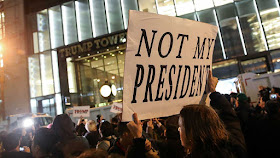 |
| Estimates Have Been Very Very Wrong |
Many tricks are used to confuse the issue and muddy the waters when we talk about the debt, one of these is which administration, or President, to blame. While Bush left office with the economy in the sewer most the resulting deficit occurred on Obama's watch. Over the last few years, the Obama administration has touted how the deficit is dropping and the economy is on the mend. Don't expect a chart put out by somebody with an agenda to clarify this issue, long ago I learned that looking at a chart to see how we are fairing can be very deceiving, little things like the scale or how they are colored often blur how we interpret their message. This has led some Americans into thinking the worst of our problems are now in the rear view mirror. One thing is clear and that is only by looking back decades do we see just how large this problem has grown.
As things stand America continues to rack up a deficit each year of nearly $2,500 for every man woman and child in the country, such deficits were unheard of in the past unless it was during a major war. Deficit spending has been accomplished by borrowing money that will become a long-term drag on the economy going forward. To make matters worse the government has fiddled away the time in deadlock rather than setting right our system. This means much of this money has been poorly spent in ways that do not address the structural problems that plague our economic future. Even the tailwind of lower energy cost through the massive expansion of oil and natural gas supplies has not been enough to move the economy forward. Much of what we have seen should be considered a "one off" that is behind us. Bottom-line all this trickles down to job growth which has been nothing to brag about when you consider many of the jobs being created are not "quality" or even full-time jobs.
Even though we have seen deficits reach unprecedented levels the deficits in our future will be dramatically worse. Any claim that the Obama administration has the budget deficit back under control is a total lie. We are mired in the midst of the greatest government debt bubble in the history of the world. By our actions or lack of action, we are destroying the future of this nation. Only when we use the massive 2009 deficit as a baseline are we given the impression the budget is back under control, it is clear that 2009 was an unplanned budget disaster and should never be used as our reference point. The ugly truth many people choose to ignore is that starting in 2017 entitlements will become the driving force that carries the deficit higher and higher into nosebleed territory.
 |
| Click Here To View The National Debt Clock |
If you want to know what the real budget deficit is, all you have to do is go to a U.S. Treasury website which calculates the U.S. national debt. On November 1, 2013 the U.S. national debt was sitting at $17,108,598955,343 just a year later on October 31, 2014 the number has risen to $17,937,160,394,872 . That means that the U.S. national debt actually grew by 829 billion in less than 12 months. The fact is with the artificially low-interest rates of today many people seem to have little desire to cut spending. We are literally gorging on debt, and most Americans seem to think that it is just fine and dandy to wildly run up debt as if there is no tomorrow. Way back in 2011 the "Gang of Six" committee’s bipartisan plan proposed three dollars of budget cuts for every one dollar in tax increases, after much tough talk this has all been forgotten. The irony is that today lawmakers, claiming to be "austerity-weary" are again looking at boosting spending on both defense and infrastructure programs.
Footnote; The post below gives a visual aid in an effort to help people comprehend the size of the national debt.
http://brucewilds.blogspot.com/2014/10/an-ugly-math-primer-on-american-debt.html







